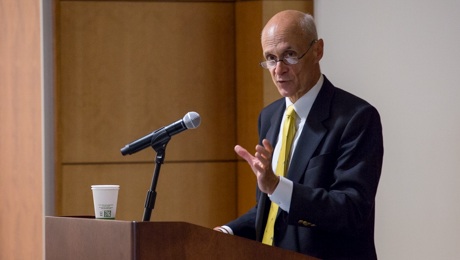By Lauren Ingeno
Our country’s economy, military, critical infrastructure and competitive advantage are at risk, said experts during a panel discussion at the George Washington University on Thursday morning.
While intellectual property theft is hardly a new phenomenon, technological advances have made it increasingly easy for hackers to steal and use trade secrets on a large scale at an alarmingly fast pace. And unless both the government and the private sector take action, the damage will only amplify.
This was the bottom line at Thursday’s cybersecurity event, hosted by the GW Cybersecurity Initiative and Covington & Burling LLP in the City View Room at the Elliott School of International Affairs. The discussion was moderated by Frank Cilluffo, director of GW’s Homeland Security Policy Institute.
“Sometimes I get asked, ‘How big is the threat?’ And I say, ‘It’s not a threat, it’s actually happening,’” said Former Secretary of the U.S. Department of Homeland Security Michael Chertoff, who is also chairman of the GW Cybersecurity Initiative, in his opening remarks. “And it is a great way to kill jobs in the United States.”
Secretary Chertoff discussed the scope of the cyber espionage problem and its potential overall impact on the U.S. economy.
He noted that the U.S. Department of Defense predicts that every year an amount of intellectual property larger than that contained in the Library of Congress is stolen from networks maintained by U.S. businesses, universities and government agencies. U.S. companies lose an estimated $250 billion per year due to intellectual property theft, Secretary Chertoff said, citing a 2012 speech from General Keith Alexander.
He also stressed the need for businesses to invest in protection against these types of attacks.
“We need to treat it as a critical corporate priority,” Secretary Chertoff said.
And it is not only small or mid-sized companies that could become victims of cyber attacks, explained William J. Lynn, III, former deputy secretary of defense.
Highly sophisticated companies such as Google and Goldman Sachs have been attacked in recent years.
So what can be done?
The first step, Secretary Lynn said, is for businesses to think about “maneuver defense.” Very often, trade secret theft is committed by corporate insiders. Secretary Lynn said corporate employees must be able to operate inside their own networks to see where penetrations might be and render them harmless.
“You need to anticipate those threats and divert them before they arrive,” he said.
But issues of cyber espionage and intellectual property theft cannot be addressed by the private sector alone, Secretary Lynn said.
Nineteen percent of data breaches in 2012 were attributed to state-affiliated actors and one fifth of all breaches were attributed to state-affiliated actors from China. State-sponsored cyber theft is especially detrimental, because it gives the attackers “an infrastructure” of how to employ the theft, Secretary Lynn said.
The U.S. needs to start thinking of ways to better “balance its relationship” with China to put a heavier weight on cyber theft.
“Right now China faces no consequences,” Secretary Lynn said. “We need to have a set of deterrents.”
Some of those deterrents could include denying access to capital markets and implementing significant tariffs.
At the same time, Secretary Lynn said he realizes finding a balance is difficult.
“You don’t want to have a regime that causes more economic damage to us than the theft that’s going on,” he said.
Stan McCoy, assistant trade representative for intellectual property and innovation, who also gave opening remarks, said the U.S. needs to begin the process of “sensitizing” the Chinese government to the gravity of these issues.
After a Q&A with Secretary Chertoff, Secretary Lynn and Mr. McCoy, five panelists from Covington & Burling LLP discussed the legal landscape and policy responses to trade secret theft and answered questions from audience members. The panel built on a paper released the same day, together with GW’s Cybersecurity Initiative, “Economic Espionage and Trade Secret Theft: An Overview of the Legal Landscape and Policy Responses.”
The GW Cybersecurity Initiative is one of the university's many interdisciplinary initiatives, which include the Global Women's Initiative and efforts in sustainability efforts, autism and computational biology.


